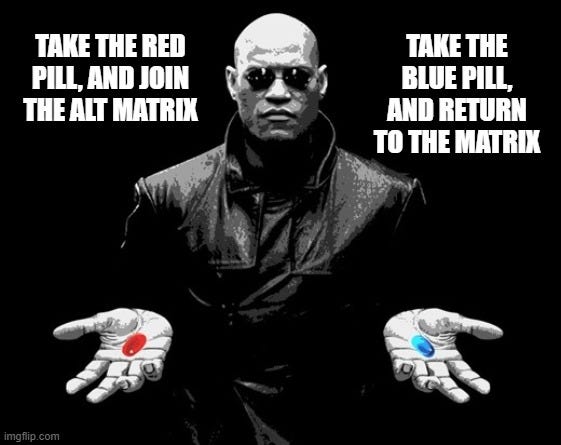Hegelian Dialectic (And Hegelian Engineering)
From the Indexed Glossary of RTE Terms, Models, and Ideas
"All the world's a stage, and all the men and women merely players: they have their exits and their entrances." -Sir Francis Bacon?
Click here for the Indexed Glossary of RTE Terms, Models, and Ideas.
Origin of Method: God only knows. You can read the Wikipedific history of dialectic reasoning, but Mathew's law suggests that you not trust Wikipedia (or even the Stanford Encyclopedia of Philosophy) to make this task easy. Approximately 104% of humans who ever lived get overly bored along the way without a serious fire lit under their asses.
For the purpose of this article, we are going to define two terms, not just one:
Hegelian dialectic, and
Hegelian engineering.
For the purpose of understanding modern society, the second term is more in play. However, the second term cannot be defined without the first.
Understand that it makes little difference what definition I choose for the dialectical system ascribed to Georg Wilhelm Friedrich Hegel. If you don't like what Wikipedia has to say (who could blame you?), you can sift through internet searches for a couple of hours to see if you're any less confused. What matters is that we're talking about a process of a sort of mass hypnosis developed by social engineers (call them 33rd degree Master Bene Gesserit witches).
Hegelian Dialectic
Definition: Hegelian dialectic is the process through which an idea evolves while bouncing around among minds that process and communicate about the idea. Through the process, the idea evolves into a more acceptable form, which then becomes something like a societal software update. Such dialectic is often presented in three stages:
Thesis: The proposition that is asserted (a version of the idea).
Antithesis: An asserted proposition opposing the thesis that mirrors the assertion.
Synthesis: A proposition that resolves the truths behind (and apparent contradiction between) the thesis and antithesis.
Examining the logical processes, we might also define,
Abstraction: Formation of the idea. This is why logic is taught in philosophy departments.
Negation: The abstracting of a true antithesis from the thesis. This is not always easy, depending on the level of challenge involved in understanding the idea.
Concretization: The achievement of the new idea through synthesis. This task is the most challenging since by definition it involves a paradigmatic leap, which we might also dub, "the Hegelian leap."
Technically, there is no reason why such dialectic must involve multiple parties. Many of the "a-ha" moments we have involve grasping a higher truth while examining our simpler notions. This is one of the reasons why, even as I greatly distrust the gurus often deployed to sell specific forms of meditation to the masses, I encourage the general development of meditative practice. However, we tend to associate Hegelian dialectic with challenging conceptual leaps that are easier to make when a group of motivated individuals bounce the ideas around.
Ultimately, this is just one useful description of how conceptual progress takes place. It is extremely useful to understand. You will fail to understand a great deal of historical philosophical dialogue without both understanding it, and soaking up the jargon used by philosophers, priests, and politicians.
When you fail to understand a technology, you allow for it to become an asymmetric asset of those who will weaponize it in order to control and rule the world.
If you fail to understand Hegelian dialectic, you are at the mercy of the social engineers who direct production of the Matrix.
Incidentally, this is why I so strongly encourage people to learn about Bitcoin, even if I have questions about its origins, and the ways in which it may be used in the ongoing currency wars.
Hegelian Engineering
You may have stumbled upon Smartee Blackhat Podcasters repeating the mantra,
Problem, Synthesis, Solution.
While technically true, this mantra may fuel an intentional and clever form of disinformation on the same level as the introduction of "Fifth-generation warfare." Having some basic formulation of Hegalian dialectic may make you feel safe, but it does not unravel the Matrix. You just think you took a red pill, which may be worse than taking the blue pill. How can you know?
Understand that I am making this up from scratch, but I've had some time to think about it. I may come back and edit this in the future as my conceptions of modern social engineering advances.
Definition: Hegelian engineering is the process by which social engineers control the dialogue surrounding ideas within a Cybernetic metaschematic in order to manipulate the evolution of society. This form of social engineering involves,
Cybernetic architects: These specialists are employed by the Military Occult Banking Syndicate (MOBS) as the "gamemakers".
Behavioral scientists: Psychologists and data scientists who work to understand the audience. Their understanding of the audience informs the other players in the engineering process.
Controlled opposition: Actors and agitators, often with invisible script writers working behind them, steer discussion of any aspect of the dialectic. These actors are charming or attractive enough to become parasocial heroes. The most complete control involves choosing actors to place on all sides of a debate, including the formation of thesis and antithesis (as they will be understood by an audience), and various aspects of the synthesis between the competing positions.
Media control: This is where we get concepts of effective governance such as, "Governance by media saturation," or as Theosophist William T. Stead called it, "Government by journalism."
Terrorists: Agents willing to harm people in order to generate a problem that requires a solution, which is then generated by the controlled Hegelian processes.
Technologists: Engineers who sequentially replace one form of media with a new one that few outside of the controlled opposition can overcome all barriers of entry to enter the conversation.
Plants: Actors and agitators in the audience whose job it is to cheer a subset of controlled players while smearing the few unchosen participants who break through the technological sieve. Yes, this can include crisis actors who aid either terrorists or terror illusionists. The technologists have given the architects tools to arrange plants for the purpose of swarming, which may be the true threat of artificial intelligence.
Mandarins: Specialists within society who vouch for the social engineering process as organic. This category of player is not mutually exclusive to the other players. System architects target Hegelian propaganda directly at the Mandarins most of all. This is because most members of the audience who choose not to try to participate generally trust the Mandarins who are at least well-educated within some apparent discipline. Mandarins are selected for what gets called "conscientiousness", but is really a sort of effective conscientiousness that implies a lack of trauma associated with some troubling level of recognition of the distinction between the Matrix and reality.
Personal Gurus: An observer may seek a confidante, priest/shaman, or therapist to talk over their perceived world (Matrix). Gurus (hence "Governance by aggressive nonsensical guruism") or specialist psychologists/psychiatrists are planted as Mandarins in the audience. This is why history goes from Hegel to Freud to Tavistock to MKULTRA, with the birth of the Theosophical Society along the way.
Distractions: All the bread and circuses any member of the target audience could desire. It's a self-funding process. You want candy? They got candy. Lots of different flavors. Yum.
Did I miss anyone? Is there some category of participants in the social engineering process left off this list? If so, please comment in the area for comments. I like productive comments.
In summary, Hegelian engineering is the process of mindwar in the Matrix.
We best understand a new concept after matching the concept to some examples, so let's name some:
Political partisanship (aimed at one world government)
Religious divisions (aimed at one world religion)
Culture wars (aimed at monoculture)
In the short term, all these examples of arranged dialogue can also simply be used to mold audience members into consumers, or simply mesmerize them while predators profile them.
Military occupation forces are an expensive way to rule other people. Less expensive is to create a town square, like a movie set, then invite people in. Give them free speech to any extent that doesn't disrupt the process, but employ a variety of crowd control methods that arrange them around the articulate and prepared Shakespearean talking heads who have been fed lines by their philosophical coaches, tasked with organizing the process by people with names like Rockefeller, Morgan, or Rothschild.
Sure, everyone has their say in the public square, but the only time most people are engaged in listening is when the intended theatrical production is amplified.
Now, since this is one of the best, most informative articles you've ever read, please like it and share it with a friend who will owe you for the rest of your lives over the education that you have bestowed on them.







When I first came across the concept of "hegelian dialectic", I saw it as a flawed and dumbed down version of the empirical method.
It fails to address the alternative possibility that one or both of the contradicting ideas are wrong and shouldn't be synthesised at all.
That in fact, it could well produce something far worse.
It surprises me that anyone could use it and not notice the massive logic hole.
Hi Mathew.
And a warning for most, TLDR. As with only a very few other stimulating read-and-responses, I might eventually update this to a substack.
First off, I fully agree with Mara about the Hegelian Dialectic, and started writing this partially inspired by Mara's response, even before reading other responses.
When I was running the biology labs at Temple. Uni. Japan, I also taught Freshman Writing and Public Speaking. In hindsight, that made sense because as I was allotting some time in the labs to reinforce the idea that science is a bootstrapping process alternating between inductive, deductive, and abductive reasoning ... (biggest influences T.S. Kuhn, Karl Popper, and C.S. Pierce), I also put a heavy emphasis on rhetoric and reasoning in the writing process for those other two classes. One technique I taught the students to recognize as a logical fallacy was "being skewered on the horns of a false dilemma".
Hmm ... wiki still has its uses. I was just checking up to see how many centuries old the formalization of that error is, but instead found something more useful. It is a subset of a "fallacy of bifurcation", and in your reframing ... the weaponization of bifurcation. Ha. A new twist on "divide and conquer". Had I been teaching those writing/speaking courses a decade or so later, I would have included examples of emergence theory, fractal theory, chaos theory, and Bayesian probability to further reinforce that fallacy.
Ooo ... found a great little video regarding the heuristics of science as I described it in labs ... https://www.youtube.com/watch?v=jX3OXwpEpl8. My example in labs was leading the students through thought-experiments using different approaches (along with assumptions, variables, controls, etc.) and the strengths and weaknesses of those approaches in "proving" a certain blend of coffee was "better" than another.
One memorable take-away from those thought experiments was that a modestly achievable goal of the scientific method is to provisionally isolate some useful correlations within an infinitely complex web of causes and effects. I can scarcely imagine the absurdity of using the Hegelian Dialectic as the primary heuristics for either the scientific method or an essay or speech worth the time to digest.
In thinking about your ending question of what actors you may have forgotten, my memory automatically raced back to Eric Hoffer's "The True Believer". Though it has been some years since I read that book, I think you may have a more sharply detailed and comprehensive description of the "bad" actors than Hoffer.
But I wonder if the targets of engineering might be more than merely crowds, consumers, or the mesmerized, and every bit as diverse and specialized (individuated, or not) as the engineers? A couple of substack buddies come to mind who might be able to shed more light than myself on the victimized ... Margaret Anna Alice (Mistakes Were Not Made) and Tereza Coraggio.
I have not yet sat down to see if the following identities, psychological constructs, or temperaments can be classified as passive actor / victims for understanding modern society, or if these are just somewhat abstract qualities of those being acted upon. Similarly, I did not see "kulangeta" among the descriptions of the engineers. I'll have to re-read and ponder over a few things ...
1 — Your starting point: "Definition: Hegelian engineering is the process by which social engineers control the dialogue surrounding ideas within a Cybernetic metaschematic in order to manipulate the evolution of society." As I tend to think in pictures and diagrams, this is quite the cognitive load.
2 — I will have to re-read your list of agents to see if they are skewed towards a particular end of a moral continuum, and then either assume we share some kind of effective altruism, posit my own, or presume Hegelian engineering is an amoral phenomenon.
That problem of morality and amoral behavior is not an easy one to untangle. Here is a very good YouTube lecture (courtesy of substack writer "streamfortyseven' that reframes the Malthusian dilemma in such a way that some, particularly "the anointed" (heads up to Thomas Sowell) can act from behind a presumption of morality, yet give a glib, post-hoc reasoning for the most morally repulsive behavior imaginable (the Trolley Car problem on steroids) ... https://www.youtube.com/watch?v=kZA9Hnp3aV4
3 — I have yet to determine if those actors are organized according to specialized jobs or social currency within an emergent hierarchy, or a mixture of the two. Edit ... after reading Eli's comment, that also got me wondering if the kulangeta ruling class really so smart as to have quantified and organized everyone and everything, or are we looking at an emergent phenomenon?
4 — I'll have to apply a filter of Bertrand Russell's "levels of language" (levels of abstraction) to those acted upon to see if they can be cast as distinct counterparts to each of the types of engineers ... or if not one-to-one counterparts, organized along some other spectrums such as degree or kind of exploitation (e.g. human trafficking) or physical-mental suffering (such as degree of anomie, PTSDs, turbo-cancers, or homelessness).
Going abductive here, but from my experience as a marginalized white person of color in Japan Inc., some terms that immediately came to mind include:
• "Stockholm Syndrome"
• "White Knight" volunteer
• range of competence / confidence from "Dunning-Kruger to "Imposter Syndrome",
• "Flying Monkey" enablers
• self awareness and the problem of 'free will' — (Joe Scott just released a relevant YouTube about this ... https://www.youtube.com/watch?v=_TYuTid9a6k),
But even while increasingly believing in a veneer theory of history and culture, when I think of the above, I can't help but to find myself spinning a wheel in the mandelbrot set. For example, the current psychiatric parlance of "white knight" does not appear much more than a re-working of Don Quijote. The above short-list of victims (or symptoms) are just the more recent constructs for earlier archetypes that can be found in cinema and literature. When I was teaching Comparative Culture in Japanese colleges, I used characters from the original "Blade Runner", from James Thurber's "The Unicorn in the Garden and Other Fables for Our Time", characters in classics like Charlie Chaplin's "Modern Times", W.F. Murnau's "Nosferatu", Fritz Lang's "Metropolis", Charles Dickens' "A Christmas Carol" ... all the way back from the Upanishads to Taoist-Zen inspired metaphors to Plato's Allegory of the Cave, Aesop's Fables, or Beowulf and beyond. I suspect you sense that too, as you used Shakespeare and Bacon to introduce an analysis of modern society.
Lots to think about here. Enough to start a good book.
Only stopping for now so that I can get a good night's sleep as a typhoon bears down on the neighborhood. Wondering if the crows and wagtails will be waiting on the veranda for their vittles tomorrow morning?
Cheers Mathew!